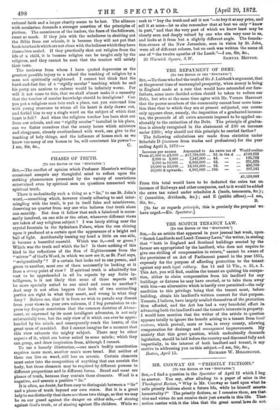PHASES OF TRUTH.
[TO TEE EDITOR OF THE " SPECTATOR.")
SIR,—The conflict of opinion which Professor Maurice's writings occasioned compels any thoughtful mind to reflect upon the striking phenomenon presented by the variety of convictions entertained even by spiritual men on questions connected with spiritual truth.
To use a homely illustration,—one man's bodily constitution requires more meat, another man's more bread. But neither of them can live on wood, still less on arsenic. Certain elements must enter into the composition of anything that can nourish the body, but those elements may be required by different persons in different proportions and in different forms. Bread and meat are phases of truth, because they contain those elements. Wood is a negative, and arsenic a positive " lie."
It is often, no doubt, far from easy to distinguish between a " lie" and a phase of truth beyond our own vision. But it is a great help to see distinctly that there are those two things, so that we may be on our guard against the danger on either side,—of sinning against God's truth, or of sinning against His children. While we There is undoubtedly such a thing as a "lie," to use St. John's word,—something which, however closely adhering to and inter- mingling with the truth, is yet in itself false and mischievous, deserving no quarter from any one who believes that truth alone can sanctify. But does it follow that such a falsehood is neces- sarily involved, on one side or the other, whenever different views are taken of any religious subject ? I was lately sitting near the crystal fountain in the Sydenham Palace, when the sun shining upon it produced at a certain spot the appearance of a bright red ball of light. Accidentally leaning my head a little on one aide, it became a beautiful emerald. Which was it,—red or green ? Which was the truth and which the lie? Is there nothing of this kind in the reflections of the Sun of Righteousness from the " mirror " of God's Word, in which we now see it, as St. Paul says, " a3nigmatically "? If a certain fact looks red to one person, and green to another, must one of them necessarily be looking at it from a wrong point of view ? If spiritual truth is admittedly too vast to be apprehended in all its aspects by any finite in- telligence, is it not likely that some of those aspects will be more specially suited to one mind and some to another ? And may it not often happen that both of two contending parties are right in what they assert, and wrong in what they deny ? Believe me, that it is from no wish to parade any dissent from your views in your own columns, if I beg permission to ex- press my deepest conviction that the common doctrine of Atone- ment, as expressed by its most intelligent advocates, is not only substantially true, but the only view of it which can ever be appre- hended by the minds, and consequently reach the hearts, of the great mass of mankind. But I cannot imagine for a moment that this view exhausts the mighty subject. There may be other aspects of it, which are better suited to some minds ; which they can grasp, and draw inspiration from, although I cannot.
seek to " buy the truth and sell it not "—to buy it at any price, an sell it at none—let ns also remember that at best we only "know in part," and that the very part of which we know least may be- clearly seen and deeply valued by one who sits very near to us, and looks at it from but a slightly different angle. The founda- tion-stones of the New Jerusalem, seen in vision by St. John, were all of different colours, but on each was written the name of one of " the twelve apostles of the Lamb."—I am, Sir, &c.,


































 Previous page
Previous page